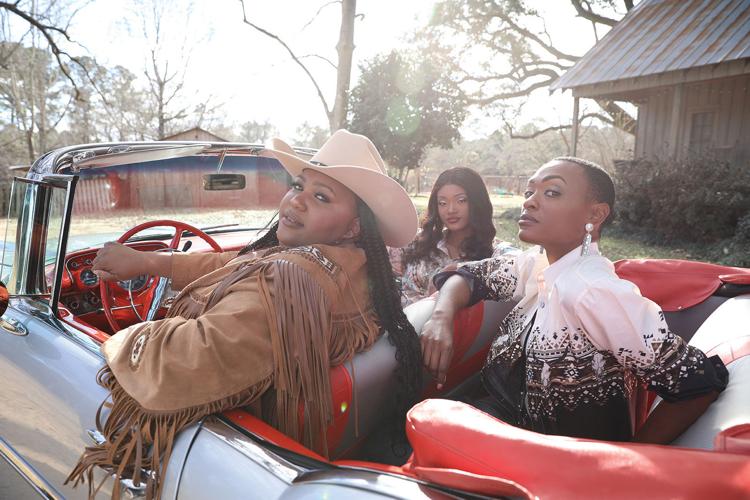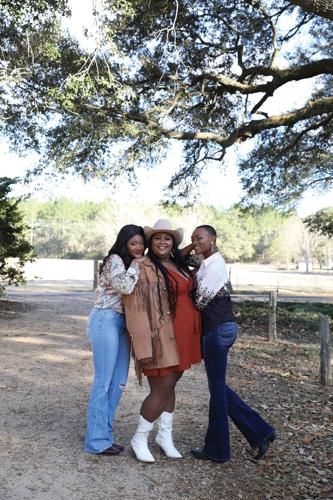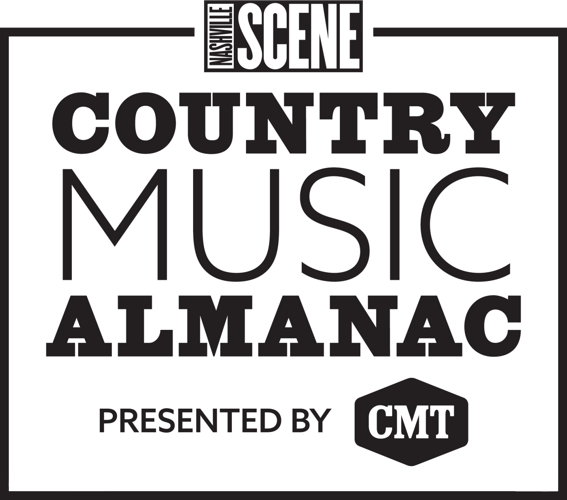
Chapel Hart may be down-to-earth, personable and welcoming, but that shouldn’t be confused with the trio caring about whether folks like them.
Sisters Danica Hart and Devynn Hart and their cousin Trea Swindle gained widespread fame with their 2022 run on NBC’s America’s Got Talent. Their audition earned them a Golden Buzzer — one of the judges’ limited opportunities to push an act forward to the next round regardless of anyone else’s input. They placed among the show’s top five contestants, and made a huge mark with the song they auditioned with, a riff on Dolly Parton’s “Jolene” called “You Can Have Him Jolene.” They say that, much like Dolly, they’d like to look back and say they’ve carved a career path that they can later remember as their own, making friends be damned.
Before the recent renown, the Poplarville, Miss.-based family of singers had spent several years establishing a foothold in country music. In 2021, they were included in CMT’s Next Women of Country.
“We’ve been around Nashville for about five or six years now — so people see this AGT success and think that this is an overnight success,” Danica says. “But we’ve been out here grinding and working, and there was a lot of times where we were, like, out here writing songs and just trying to just get our music out or share it with other writers.”
As the trio prepared for a performance and video shoot with Darius Rucker at a Hendersonville horse farm in mid-December, they relayed stories of their high-energy nature and finding ways to remain themselves. For example, the AGT wardrobe crew eventually had to separate the band in an effort to contain them.
“We gave them hell — pure hell,” says Trea. “They hated to see us coming out there.”
The group recalls that the wardrobe team would dress 90-person dance troupes together and then ask each member of the trio to come individually.
“Shout out to the wardrobe department there,” Danica says. “We just knew it kind of all goes toward just being ourselves, and telling folks to take a chance on themselves. When you take a chance on you and you’re being you — even if you fail or even if you lose — you did it on your terms and that you can always walk away and be proud of. You can walk away with a win every time.”
Despite Chapel Hart’s talk of potential failure, their wins certainly seem to be accumulating: Before she died in late 2022, Loretta Lynn requested that they redo one of her classics: Chapel Hart recorded a fuck-around-and-find-out twist on “Fist City” called “Welcome to Fist City” that’s set to debut any day now. And before they finish up their first headlining tour, called Glory Days, the family trio is slated to make a return visit to the Grand Ole Opry, playing Opry at the Ryman alongside Caitlyn Smith, Marty Stuart and Chris Young on Jan. 21.
I remember reading that you heard that some fourth-graders near your hometown said you were the most famous folks they knew that came from Mississippi. Can you speak a bit to the power of that, of kids seeing people like themselves perform?
Trea: I think especially music as a career — it’s something that’s kind of unheard of in our hometown, because you’ve just never really heard anybody do it. But I know that there’s so many little boys and little girls who would like to pursue music as a career, but you know, they’ve always been told that that’s not a real job or that’s not a career. You have to get a real job. And so I think it’s just super awesome that now they have an example to look at and say that it’s definitely possible with hard work and putting in the time.
Danica: We haven’t been doing this for a crazy, crazy long time, but you know, we have been in it for a minute, and so it does blow my mind to see all the kinds of fans we have. … We’re showing up to shows, and we look out and there is a sea of senior citizens who are coming out to see us, and they’re also up past their bedtimes for meet-and-greets, and they’re thanking us.
Trea: And please believe, the senior citizens will let you know. They will say, “I don’t listen to the radio anymore.”
Danica: The seasoned folks don’t got time for the B.S., so if it ain’t good, they’re gonna tell you it ain’t good. But also on the other side of that, and the most beautiful part is: When it’s something that moves and inspires them, even after they’ve been through a lot — through wars and some of life’s hugest events — for them to come and go, “Man, this moved me, I was inspired tonight.” There’s no greater honor, I think.
Can you talk a little bit about the emotional parts of being on a show like America’s Got Talent? These things are competitive, and they’re sort of set up for high emotional response and this element of pageantry.
Trea: Let me just say the whole thing is, like you said, pageantry. It’s a talent show, a music contest, but it is very much television, and there’s a lot of things you have to redo and then do over again. One episode is a three-day process. [During the audition] we were just at the end of our ropes, tired and worn out. We sang the song and we were literally just hoping for at least three yeses. And at that point, all of the Golden Buzzers were already gone. And so whenever it happened, and we got a Golden Buzzer, it really was a complete genuine response. It took us by surprise.
Devynn: I think that’s kind of what made our time on AGT so fun, because we went and we didn’t have some competitive strategy. Now, making friends was sometimes a little bit difficult because we are very loud. And so when we would come in on like a 10, and everybody’s like on a 3, and we’re like, “GOOD MORNING, EVERYBODY!” And they’re like, “Good morning, Chapel Hart.” We just go and we Chapel Hart it up, wherever we are.
Danica: We didn’t know what to expect with television. … When we hit the stage, the people kind of were like, “Wait? whoa, what’s about to happen?”
Doing a riff on a Dolly song is pretty ballsy, too.
Danica: Which is why we were gonna do “9 to 5.” But 30 minutes before, we were kind of going over the music and we ran through that, and then “You Can Have Him Jolene.” And there was this hush in the room, and we knew this was it — but that this was the ballsy move. “Jolene” proved to be the greatest choice I think that we could have made. But also it could have gone a totally different direction there. … It gave us the courage and the confidence to go through the actual show, and to trust our gut and just go, “Look, this is what we’re gonna do.” The production kind of fought us on some of the songs and thoughts and all the things that we wanted to do. And there [were some times when] we were just like, “You know what, do what you do, and we’re going to do this song, we’re going to wear this outfit, and we’re gonna do this.” It gave us the confidence to just be ourselves in the entire process.

What about plans to move closer to Nashville? What do you love or hate about the city, and is there anything holding you back from being here full time?
Danica: Nashville. I would move to Nashville in a heartbeat. If I can pack a bag and grab an apartment, I’d be here every day, all day. I love it so much. It’s the moving I don’t love. I hate the airport and I hate moving. When I can see that I’m going to have time to recover after the move, then I’ll officially move to Nashville.
Trea: I’m not itching to move to Nashville. I hope that eventually one of my homes will be here, just for convenience sake. Right now we’re on the road so much, and I only hope that we continue to be on the road so much. People ask where we live, I just say, “the interstate,” because we spend more time on the road than we do at home. And right now, it’s pretty much a question of where the mail goes. And since the property taxes are a little bit lower where I live in Louisiana, that’s where the mail goes.
Devynn: I guess that leaves me. It’s not that I don’t enjoy Nashville. Nashville is very fast, and I personally just kind of prefer the quietness and the Mississippi living. You know, it’s also just different. Nashville sometimes doesn’t have the same community feel as back home.
Danica: Even as a group or collective, it can sometimes feel like everything in town feels like a business move. Even in making friends, it can sometimes be like, can we just put a wall down and talk?
Devynn: And back home it’s like, they’ll just call you out: They’re like, “Girl, look at your big-ass head.”
Danica: I do think asking us about Nashville right now is a little like asking a 21-year-old what they want to do with the rest of your life. You got time, you know? You got time. And we got time.
Talk a bit about your experience with performing at the Grand Ole Opry in September.
Danica: You don’t grow up in the country and you don’t grow up on country music [without the Opry being the] pinnacle for you as a musician, you know what I mean? So wanting to sing there has always been the dream, and there is absolutely no other feeling like standing in that circle. Oh my God. Where everyone in country music has stood. Well, not everyone — everybody don’t get the chance.
Trea: It might sound cliché, but it is literally like a family once you’re there, which we didn’t expect. We just kind of got snuggled right in there.
When you’re doing a take on a Loretta Lynn song, does it feel intimidating to find the right way to update a classic?
Trea: It definitely is intimidating. One thing Danica’s always said, she’s like, “If you’re gonna do a cover, it either has to be just as good or better.” And even though it’s not a cover, you still want to pay homage to that person and, you know, do them proud. So in a sense there, the pressure is definitely there. But we did let Loretta’s granddaughter Tayla hear the song after Loretta passed, and her face just lit up.
Danica: It just made my heart so happy. We let her hear it and she’s like, “Awww, Meemaw would’ve loved this!” There’s some relief in that, but also as a songwriter, it’s more of just an honor to be able to be part of that story, to be an extension of a story. To be able to say, “Loretta tried to warn you that she’d take you straight there and you didn’t listen.” And so now it’s “Welcome to Fist City.” It’s a beautiful thing.
Country music can be especially tough to break into for Black artists, but you all obviously love the genre and performing so much. How do you grapple with the industry, which can at times not be fair or good to y’all?
Danica: One of the most beautiful things for us is that the older generation of country music singers have embraced us so much and have been so supportive, and have been the folks to just reach out to tell us what they think of our songwriting. [Early on in Nashville], we would always get things like, “Oh man, this is good, but you should be paired with such-and-such. You should write with such-and-such.” In the back of our mind, it felt like [they were saying], “Well, it’s good, but it’s not good enough. It’s not good enough to compete here itself.” You can accompany or write with someone, but are not allowed to just do it on your own.
Devynn: I think it’s almost like a full-circle moment in a sense, because there’s been plenty of nights that we’ve gone to in Nashville and we would come up with something that we want to say. And folks in the room might be like, “Maybe you shouldn’t say that.” Or, you know, “Maybe let’s try something a little less ‘this,’ or whatever.” But when you have people like Loretta Lynn and Tanya Tucker who are, you know, commending our writing — because the stuff that we say are pretty much things that they would say — it’s just, like, “Well, I think if these women are OK with this, I think it’s OK.”
We talk with Chapel Hart, discuss the intersection of trans rights and roots music, take a deep dive into data and more









